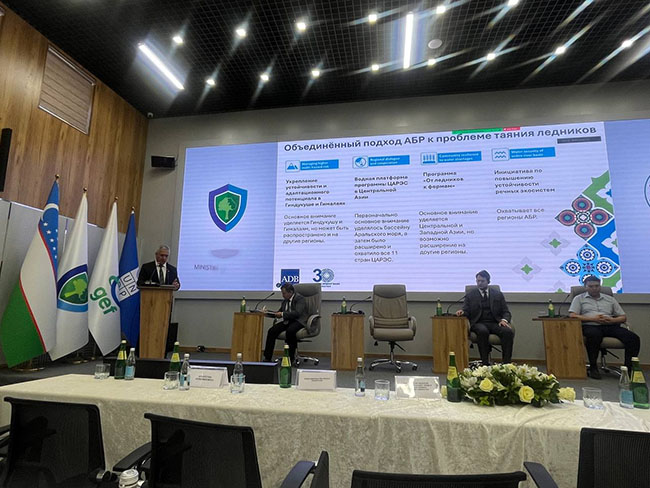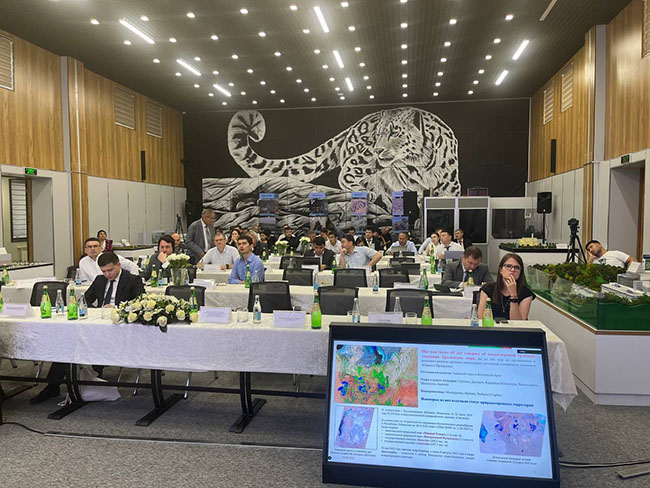No. 50 (574) June 2025
REGIONAL DIALOGUE ON WATER DIPLOMACY: CHALLENGES, SOLUTIONS AND PARTNERSHIPS
On June 4, 2025, the Central Asian University on Environment and Climate Change (Green University) hosted a workshop titled "Regional Dialogue on Water Diplomacy: Challenges, Solutions, and Partnerships." The event brought together approximately 50 participants, including representatives of government agencies, regional and international organizations, academia, and civil society. Ms. Dinara Ziganshina, Director of SIC ICWC participated in the workshop.
This workshop marks the first one in a series of water diplomacy events organized as part of the joint Uzbek Ministry of Ecology, Environmental Protection and Climate Change, UNDP and GEF project "Conservation and Sustainable Management of Lakes, Wetlands, and Riparian Corridors as Pillars of a Resilient and Land Degradation Neutral Aral Basin Landscape Supporting Sustainable Livelihoods".

The workshops series aims to foster a comprehensive regional dialogue and encourages Central Asian states to collaborate in achieving a balanced and efficient use of shared water through the following:
- Discussing prospects for transboundary water cooperation between Uzbekistan and other riparian countries in the Aral Sea Basin.
- A multi-stakeholder dialogue on integrated water resources management (IWRM) programming.
- Showcasing successful examples of regional water policies in Central Asia and best water use practices.
- Providing an inter-agency cooperation platform to support sustainable water use and land degradation neutral, climate-smart and water-saving agriculture.
- Highlighting the interconnectedness of land degradation, climate change, and water security.
- Engaging representatives of government agencies, NGOs, academia, and women’s and youth groups in open discussions on shared challenges and opportunities for collaboration.


Ms. Ziganshina delivered a presentation on "Transboundary Water Cooperation under umbrella of ICWC: Achievements and Prospects." The participants were introduced to the structure and functions of ICWC and its executive bodies - SIC ICWC, BWO Amu Darya and BWO Syr Darya.
She listed the following key areas of activity of SIC ICWC:
- Research, consultancies, data collection and dissemination.
- CAWater-Info platform, which facilitates information exchange (supported by the International Climate Initiative (IKI) - and the Government of Germany).
- Professional development courses for specialists from the Central Asian countries, including practical training in modeling tools such as WEAP and LEAP as part of a project with the World Bank and SEI on water-energy nexus systems modeling.
- Expeditions to the dried seabed of the Aral Sea.
- Joint ecosystem preservation initiatives in the Amu Darya basin (supported by GIZ).
- Supporting the implementation of environmental commitments under international agreements.
Among the most recent initiatives of SIC ICWC is the establishment of the Central Asian Expert Platform on water security and sustainable development. This platform aims to support the development of scientific evidence-based regional policies.
As the key future tasks, Ms. Ziganshina mentioned the following:
- Strengthening basin-wide and cross-sectoral planning.
- Implementation of automated water accounting and forecasting systems.
- Adaptation to climate change.
- Developing a legal and economic framework for sustainable water use.
- Promoting investment in education and science.